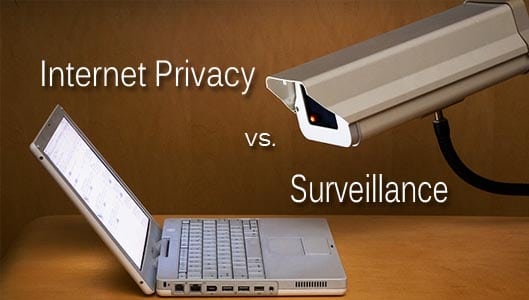Internet Privacy vs. Surveillance. Which side are you on?
There is a battle waging online right now, one that is shaping up to have a pretty strong influence on the outcome for online privacy. There is also an emerging factor at play that promises to make this controversial subject one to watch…
The online privacy vs. online surveillance debate isn’t new anymore. Ed Snowdon, Silk Road, the Tor network, phone hacking scandals and the shaping of the “Internet of Things” have all thrown the issue of Internet privacy forefront and center, and there are two distinct sides.
On the side of surveillance we naturally have the surveillance companies, operating on behalf of spy and security agencies like the NSA, who are facing a reality where criminals – including religious extremists and terrorists – are increasingly turning to the Internet to communicate, plan and even recruit.
Without the ability to track their movements and intercept their communications, team surveillance will argue that they are unable to do their jobs effectively, and since their job description is essentially keeping the rest of us safe, this could have very damaging ramifications.
On the other side of the argument we have team privacy, which generally consists of the typical Internet user, many technology companies serving those users, entities like the ACLU, as well as those companies that develop software designed to provide anonymity on the Internet.
The argument of team privacy is that every Internet user has the inherent human right to complete privacy on the Internet, a privacy that cannot be compromised so easily by the need for surveillance. This argument is furthered by the fact that surveillance companies have demonstrated that they cannot be necessarily trusted with such a responsibility, as highlighted by NSA whistle-blower Ed Snowdon.
Such revelations bring up legitimate concerns of trust. Whilst the NSA and other intelligence agencies may be charged with keeping their respective countries safe from attack, can their surveillance be used for other, more nefarious (or at least irrelevant) means than simply tracking those who seek to use the Internet to commit crimes?
Sponsored Content. Continued below...
There are of course genuine arguments to both sides of the coin. A country has the right to try and protect its citizens from criminals both foreign and domestic to the best of its ability. A citizen has a basic human right to privacy, even from the people trying to protect them. It’s a tightrope that has frustrated both sides who try to walk it.
Recently, however, there has been another factor at play. One that takes the control from the hands of team surveillance and places it directly into the hands of team privacy, and almost promises to end the debate once and for all.
That is the development and distribution of increasingly sophisticated encryption and anonymity tools and technologies available to the general public. So sophisticated that even the authorities themselves cannot sidestep them.
The Tor Network. Bitcoin. OpenPGP. The rising popularity of VPNs. These are technologies on offer to Internet users that allow them to mask their Internet activities from anyone, including the authorities, regardless of which direction the privacy vs. surveillance battle swings.
These easily obtainable technologies allow any user to surf the Internet, leave messages, create websites, all without being traced, with as close a guarantee to total privacy as you can realistically attain.
Just look at the Silk Road website operated by Ross Ulbricht, an online marketplace selling illegal goods that utilised the Tor Network and Bitcoin. With the right software anyone could visit and use the website, yet it took years for the authorities to track down the man behind it, and they still relied on him making quite rudimentary mistakes. All possible because of technologies that prioritise anonymity.
These encryption and anonymity technologies are team surveillance’s worst nightmare. If they are to increase in their popularity and work their way into the mainstream, the debate between surveillance and privacy would be rendered moot. Even if legislation no longer hampered team surveillance, technology would.
And with companies like Apple and Google, even Facebook, offering their users with increasingly stronger encryption techniques, team surveillance are suffering blow after blow. Stronger – practically unbreakable – encryption techniques offer anonymity to criminals just as they do the every day Internet user, surveillance companies argue. Basically, it provides a way for serious criminals and terrorists to hide on the Internet.
The ideal solution – a solution that affords ultimate privacy to the innocent and none for the guilty – may be an impossible task, but for the time being this debate is one to keep an enthusiastic eye on.
So what side are you on? Place yourself in a hypothetical situation – if you were on team surveillance – responsible for tracking serious criminal activities on the Internet, how would you feel or react to the increase to strong encryption available to the general public and criminals alike? Let us know below.
Continued below...
Thanks for reading, we hope this article helped, but before you leave us for greener pastures, please help us out.
We're hoping to be totally ad-free by 2025 - after all, no one likes online adverts, and all they do is get in the way and slow everything down. But of course we still have fees and costs to pay, so please, please consider becoming a Facebook supporter! It costs only 0.99p (~$1.30) a month (you can stop at any time) and ensures we can still keep posting Cybersecurity themed content to help keep our communities safe and scam-free. You can subscribe here
Remember, we're active on social media - so follow us on Facebook, Bluesky, Instagram and X
